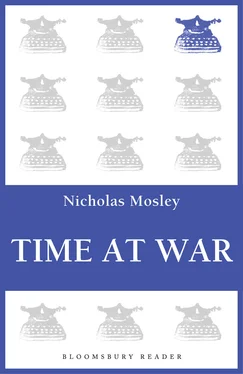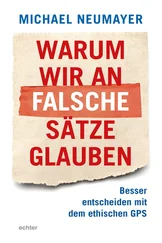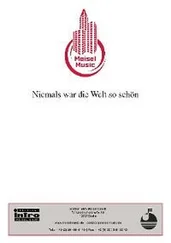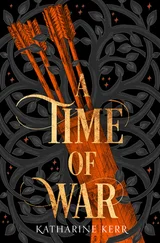From one of our positions I wrote to my father –
I have constructed for myself a pleasantly secluded little dungeon in the rubble of a ruined house, about 7ft by 5ft and 3ft high, in which I hibernate for 24 hours a day, passing the time happily in communing with the less lofty Muses, concocting grotesque dishes of tinned food to fry over a tiny petrol fire, and beating off the savage assaults of many rats who share my compartment. For a limited period I am strangely content to exist thus. Unfortunately the higher Muses cannot be invoked because one has not yet achieved the degree of detachment whereby the inquiring mind can free itself from bodily squalor.
But then from the luxury of a tent in the valley –
Have been reading quite a lot of Shakespeare and Ibsen — food for interesting comparison. But it seems to me that the greatness of both as artists depends on the fact that they are neither of them profound or ardent philosophers. Thus they produce art for art’s sake; even Ibsen, who is careful in his plays never to solve the problems he presents; or if he does, to contradict his first solution in a later play, thus using social, moral and spiritual problems merely as a framework for his art. This leads me to wonder if philosophy and perfect art can ever be reconciled. In Goethe, perhaps you would say? But that is a subject I know little about.
I was still dreaming about possibilities for life after the war. For so long even before the war the family had been split — with my father, my stepmother and my half-brothers in their beautiful house in Derbyshire; my sister, brother and Nanny in my mother’s old home at Denham, Bucks, under the eye of my Aunt Irene; and myself happy to move between the two. Then, at the start of the war the Derbyshire house had been relinquished, the house at Denham had been requisitioned by some hush-hush scientific establishment, and my brother Micky and Nanny had gone to stay with my other aunt, Baba, in Gloucestershire. Now my father and Diana were settled into a new house and — and what? It seemed that only I thought it feasible that we should all get together again. Eventually I wrote to my sister — ‘If Daddy does not want to accept the Micky guardianship of course it puts everything in a different light. I totally agree with you that we must not forget the old Aunt Nina — Nanny ties, and if, as you say, we cannot combine them with the Daddy ties, they must be kept separate but intact.’
And as if to assure each other of the sanctity of old childhood ties, when I came to give my sister a first intimation of the battle of Casa Spinello, in order to divert the attention of the censor I described it as if it had been one of our children’s games –
I have been playing the Cornwall game with a bunch of the most energetic Germans, who defended their base with distressing determination. However, it was the long run round the kitchen garden that did it in the end, and the crafty lurk on top of the garden wall; and then we were into the swimming-pool area, too close for sight, and the poor dears are not very good when it comes to touch. But serioso, the lionesque games are an excellent training for this sort of life. We had a little skirmish around a farmhouse, the success of which I attribute very largely to my ability to leap over staircases, vanish into lavatories, and come crashing through the plaster of a roof.
Then, when we got to the place where there was the race each night to the bridge over the river –
I find that lions in the open with the Germans is not nearly so exhilarating as lions in the house. In fact it is pure hell. I am at the moment horribly war-weary and longing for a little wound in the arm again.
I was granted four days’ leave in Florence. I remember little of this, my first visit to Florence, except that the museums and galleries were closed with their works of art in crates in the cellars. So the beautiful buildings had more than ever the air of fortresses, of a town fashioned by war, the home of the Medicis and Savonarola. But then, was it not true that great art had been produced in time of war when people had been in daily confrontation with danger and death, with extremes of evil and sanctity? In my memory the statues of Michelangelo’s David and Cellini’s Perseus were still on show in the square. Or must these have been copies? I remember absurdly bribing my way into the locked Bargello Museum and in the basement staring at a crate that was said to contain Donatello’s David.
I had another letter from Mervyn, who was now in hospital in Rome. He was distressed to hear that the reinforcements he had asked to be sent up to Spinello had walked into the minefield, and that their company commander, Ronnie Boyd, had been killed.
Dear Nick, I feel in a frantic letter-writing mood so I am going to set about you. I have been lying in bed (in many hospitals, in many places) and saying to myself every day — now you must do something more than reading Esquire and get on to reading something intense like Nietzsche; and writing copious notebooks which no one will ever read except yourself. But every day has been just the same, and I still stare weakly at Esquire, different copies of which appear from I don’t know where.
I’m still worried over that Ronnie Boyd business for I told the CO to send ‘F’ Company along that way, having travelled it myself.
I met a Rifle Brigade subaltern on my way down: I forget his name, but he asked after you. Typical R.B., because he evidently regarded you as eccentric in staying away from the R.B. which to him, he made plain, was the most satisfactory regiment one could ever be in. He was very nice.
This leg of mine is getting on well, but they keep messing around with my arm, and I gather are going to do a third operation on it. Myself I think there is nothing wrong with it, I’m afraid.
I am so glad to have remembered to tell you that the Penguin Shakespeares must be avoided. I had been reading Hamlet off and on for months from the normal version in that American book I had. In hospital I picked up a Penguin Hamlet and the difference is distressing. Nearly as bad as reading the Bible R.V. after being used to the A.V.
I must try to get a few books while in this place for it was so enjoyable to argue about T. Mann and so on, and to discover that you were a Hellenist pagan and that I was a puritan more than I realised. I must get you weaving on Tolstoy — myself too, for I have not really worked him out. Did you finish Resurrection? It was horribly translated but the simplicity of the ideas that the chap arrived at were very impressive. Nekhlyudov I think he was called. I love these Russian names.
Good luck and learn to go carefully. No heroics. Yours, Mervyn.
As Christmas approached we were in a quieter part of the line and the weather cleared. There was a slope to a valley below and no sign of Germans; we could once more sit and admire the beautiful landscape. There was a farmstead in the valley that seemed deserted — except for a pig or two that snuffled about and a gaggle of strutting turkeys. We eyed these greedily. As soon as we were out of danger we were aware of hunger. It occurred to me, and I think to all my platoon, that for once a really sensible patrol would be to go down into the valley and take prisoner a few turkeys. One of my men claimed to have been in civilian life a butcher; he said that if we escorted him to the farmyard he would dispatch a few of them quickly and silently. So we set off, just before dusk, fully armed, five or six of us; and we proceeded peacefully into the valley. We surrounded the hut where we had watched the turkeys go to roost; the self-designated butcher crept in with a bayonet. After a moment the hut exploded as if a grenade had gone off inside; turkeys flew squawking and flapping in all directions, the man with the bayonet in pursuit of them vainly. Someone shouted, ‘Shoot them!’ I shouted, ‘No!’ Eventually we managed to capture a few. We carried them back in triumph and had our pre-Christmas dinner.
Читать дальше












